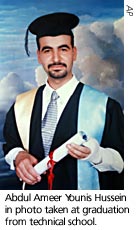New York, April 5, 2006—The Committee to Protect Journalists welcomes the decision today by an Iraqi criminal court to acquit a CBS cameraman held in U.S. custody in Iraq for one year without due process. A three-judge panel from Iraq’s Central Criminal Court dismissed charges against Abdul Ameer Younis Hussein, an Iraqi cameraman working for CBS News, of collaborating with insurgents, citing a lack of evidence. The charges were not made public before the trial.
CBS News Senior vice president Linda Mason told CPJ that Hussein was taken back to Baghdad’s Abu Ghraib prison after the hearing, but he was expected to be released on Thursday.
“We are greatly relieved that all charges have been dropped and anxiously await the release of Abdul Ameer Younis Hussein,” said CPJ Executive Director Ann Cooper. “Our relief is tempered, however, by the fact that Hussein spent a year in custody without minimum due process.”
Hussein was detained after being wounded by U.S. forces’ fire as he filmed clashes in Mosul in northern Iraq on April 5, 2005. CBS News reported at the time that the U.S. military said footage in his camera led them to suspect Hussein had prior knowledge of attacks on coalition forces.
During his court appearance Hussein, who wore a yellow jumpsuit, was not permitted to speak to reporters. Between appearances on the witness stand, he had to kneel on the floor in the back of the courtroom, facing a wall — highly unusual in an Iraqi court. A half dozen U.S. soldiers in full body armor stood nearby, guarding him and other Iraqi defendants in other cases, who also faced the wall, CBS reported.
The New York Times reported last year that the U.S. military referred Hussein’s case to Iraqi justice officials who reviewed Hussein’s file but declined to prosecute until the recent trial. For months, U.S. military officials have made unspecific accusations that Hussein was “engaged in anti-coalition activity” and was “recruiting and inciting Iraqi nationals to violence against coalition forces and participating in attacks against coalition forces.”
Scott Horton, an American lawyer representing Hussein in Baghdad was quoted today as saying that Hussein was accused of having prior knowledge of an April 5, 2005 car bombing that he went to film at the time of his wounding and arrest. Horton also said Hussein was accused of celebrating the attacks with Iraqis, and The Associated Press reported that Hussein stood next to an armed man who was inciting the crowd. Hussein maintained he was merely at the site to report the event, when he was shot and later arrested. Horton said journalists have increasingly become targets in Iraq. As the lawyer spoke to reporters in a parking lot from the courthouse, Iraqi security forces began firing shots in the air, demanding cameramen stop filming. Within seconds they were pointing guns at the reporters, forcing everyone to retreat.
“This shows the reckless indifference to the safety of journalists I’ve been talking about,” Horton said later, adding that courthouse officials had told him interviews could be conducted in the parking lot. Cameramen were temporarily detained as security forces tried, unsuccessfully, to confiscate their tapes.
Hussein is the last remaining journalist in U.S. custody in Iraq. CPJ documented seven cases in 2005 alone in which U.S. forces detained Iraqi journalists for periods of many weeks or months without charge or due process. Of the seven long-term detainee cases documented by CPJ, all but one journalist (Hussein) was eventually released without charge. Most detained journalists were Iraqis working for Western news organizations held on vague accusations that they had prior knowledge of attacks on coalition forces they went to film, or of working in collaboration with insurgents. In at least five cases documented by CPJ, the detainees were photojournalists who drew the military’s attention because of what they had filmed or photographed. In addition to the prolonged detentions, CPJ has received reports of numerous other detentions of shorter duration.
“This record highlights the arbitrary nature of the judicial process,” said Cooper. “We hope that recent pledges by the military to address this issue will put an end to these open-ended detentions of journalists which seriously undermine the ability of journalists to report the news.”
Last month U.S. officials’ pledged to begin prompt, high-level reviews of cases in which journalists are detained by troops in Iraq. Maj. Gen. John Gardner said that the U.S. military had established a new goal of reviewing cases of detained journalists within 36 hours and that U.S. troops across Iraq have been ordered to report the arrest of anyone claiming to be a journalist to Gardner personally, and news organizations will be given the chance to vouch for their journalists. Legitimate journalists, he said, would be released swiftly and watching or filming combat, and meeting insurgents are not in themselves grounds for arrest.
